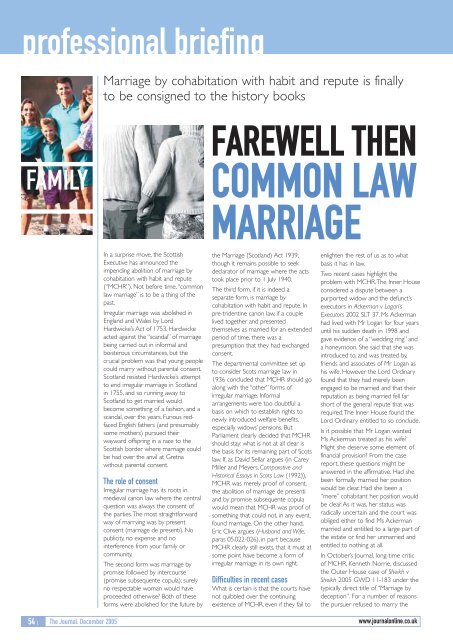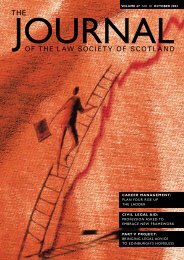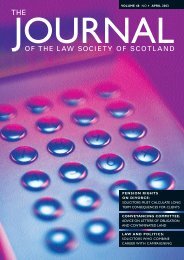Coulsfield reports civil justice as ripe for review Coulsfield reports ...
Coulsfield reports civil justice as ripe for review Coulsfield reports ...
Coulsfield reports civil justice as ripe for review Coulsfield reports ...
Create successful ePaper yourself
Turn your PDF publications into a flip-book with our unique Google optimized e-Paper software.
professional briefing<br />
FAMILY<br />
54 :<br />
The Journal: December 2005<br />
Marriage by cohabitation with habit and repute is finally<br />
to be consigned to the history books<br />
In a surprise move, the Scottish<br />
Executive h<strong>as</strong> announced the<br />
impending abolition of marriage by<br />
cohabitation with habit and repute<br />
(“MCHR”). Not be<strong>for</strong>e time,“common<br />
law marriage” is to be a thing of the<br />
p<strong>as</strong>t.<br />
Irregular marriage w<strong>as</strong> abolished in<br />
England and Wales by Lord<br />
Hardwicke’s Act of 1753. Hardwicke<br />
acted against the “scandal” of marriage<br />
being carried out in in<strong>for</strong>mal and<br />
boisterous circumstances, but the<br />
crucial problem w<strong>as</strong> that young people<br />
could marry without parental consent.<br />
Scotland resisted Hardwicke’s attempt<br />
to end irregular marriage in Scotland<br />
in 1755, and so running away to<br />
Scotland to get married would<br />
become something of a f<strong>as</strong>hion, and a<br />
scandal, over the years. Furious redfaced<br />
English fathers (and presumably<br />
some mothers) pursued their<br />
wayward offspring in a race to the<br />
Scottish border where marriage could<br />
be had over the anvil at Gretna<br />
without parental consent.<br />
The role of consent<br />
Irregular marriage h<strong>as</strong> its roots in<br />
medieval canon law where the central<br />
question w<strong>as</strong> always the consent of<br />
the parties.The most straight<strong>for</strong>ward<br />
way of marrying w<strong>as</strong> by present<br />
consent (marriage de presenti). No<br />
publicity, no expense and no<br />
interference from your family or<br />
community.<br />
The second <strong>for</strong>m w<strong>as</strong> marriage by<br />
promise followed by intercourse<br />
(promise subsequente copula); surely<br />
no respectable woman would have<br />
proceeded otherwise? Both of these<br />
<strong>for</strong>ms were abolished <strong>for</strong> the future by<br />
FAREWELL THEN<br />
COMMON LAW<br />
MARRIAGE<br />
the Marriage (Scotland) Act 1939,<br />
though it remains possible to seek<br />
declarator of marriage where the acts<br />
took place prior to 1 July 1940.<br />
The third <strong>for</strong>m, if it is indeed a<br />
separate <strong>for</strong>m, is marriage by<br />
cohabitation with habit and repute. In<br />
pre-tridentine canon law, if a couple<br />
lived together and presented<br />
themselves <strong>as</strong> married <strong>for</strong> an extended<br />
period of time, there w<strong>as</strong> a<br />
presumption that they had exchanged<br />
consent.<br />
The departmental committee set up<br />
to consider Scots marriage law in<br />
1936 concluded that MCHR should go<br />
along with the “other” <strong>for</strong>ms of<br />
irregular marriage. In<strong>for</strong>mal<br />
arrangements were too doubtful a<br />
b<strong>as</strong>is on which to establish rights to<br />
newly introduced welfare benefits,<br />
especially widows’ pensions. But<br />
Parliament clearly decided that MCHR<br />
should stay: what is not at all clear is<br />
the b<strong>as</strong>is <strong>for</strong> its remaining part of Scots<br />
law. If, <strong>as</strong> David Sellar argues (in Carey<br />
Miller and Meyers, Comparative and<br />
Historical Essays in Scots Law (1992)),<br />
MCHR w<strong>as</strong> merely proof of consent,<br />
the abolition of marriage de presenti<br />
and by promise subsequente copula<br />
would mean that MCHR w<strong>as</strong> proof of<br />
something that could not, in any event,<br />
found marriage. On the other hand,<br />
Eric Clive argues (Husband and Wife,<br />
par<strong>as</strong> 05.022-026), in part because<br />
MCHR clearly still exists, that it must at<br />
some point have become a <strong>for</strong>m of<br />
irregular marriage in its own right.<br />
Difficulties in recent c<strong>as</strong>es<br />
What is certain is that the courts have<br />
not quibbled over the continuing<br />
existence of MCHR, even if they fail to<br />
enlighten the rest of us <strong>as</strong> to what<br />
b<strong>as</strong>is it h<strong>as</strong> in law.<br />
Two recent c<strong>as</strong>es highlight the<br />
problem with MCHR.The Inner House<br />
considered a dispute between a<br />
purported widow and the defunct’s<br />
executors in Ackerman v Logan’s<br />
Executors 2002 SLT 37. Ms Ackerman<br />
had lived with Mr Logan <strong>for</strong> four years<br />
until his sudden death in 1998 and<br />
gave evidence of a “wedding ring” and<br />
a honeymoon. She said that she w<strong>as</strong><br />
introduced to, and w<strong>as</strong> treated by,<br />
friends and <strong>as</strong>sociates of Mr Logan <strong>as</strong><br />
his wife. However the Lord Ordinary<br />
found that they had merely been<br />
engaged to be married and that their<br />
reputation <strong>as</strong> being married fell far<br />
short of the general repute that w<strong>as</strong><br />
required.The Inner House found the<br />
Lord Ordinary entitled to so conclude.<br />
Is it possible that Mr Logan wanted<br />
Ms Ackerman treated <strong>as</strong> his wife?<br />
Might she deserve some element of<br />
financial provision? From the c<strong>as</strong>e<br />
report, these questions might be<br />
answered in the affirmative. Had she<br />
been <strong>for</strong>mally married her position<br />
would be clear. Had she been a<br />
“mere” cohabitant her position would<br />
be clear. As it w<strong>as</strong>, her status w<strong>as</strong><br />
radically uncertain and the court w<strong>as</strong><br />
obliged either to find Ms Ackerman<br />
married and entitled to a large part of<br />
the estate or find her unmarried and<br />
entitled to nothing at all.<br />
In October’s Journal, long-time critic<br />
of MCHR, Kenneth Norrie, discussed<br />
the Outer House c<strong>as</strong>e of Sheikh v<br />
Sheikh 2005 GWD 11-183 under the<br />
typically direct title of “Marriage by<br />
deception”. For a number of re<strong>as</strong>ons<br />
the pursuer refused to marry the<br />
www.journalonline.co.uk










